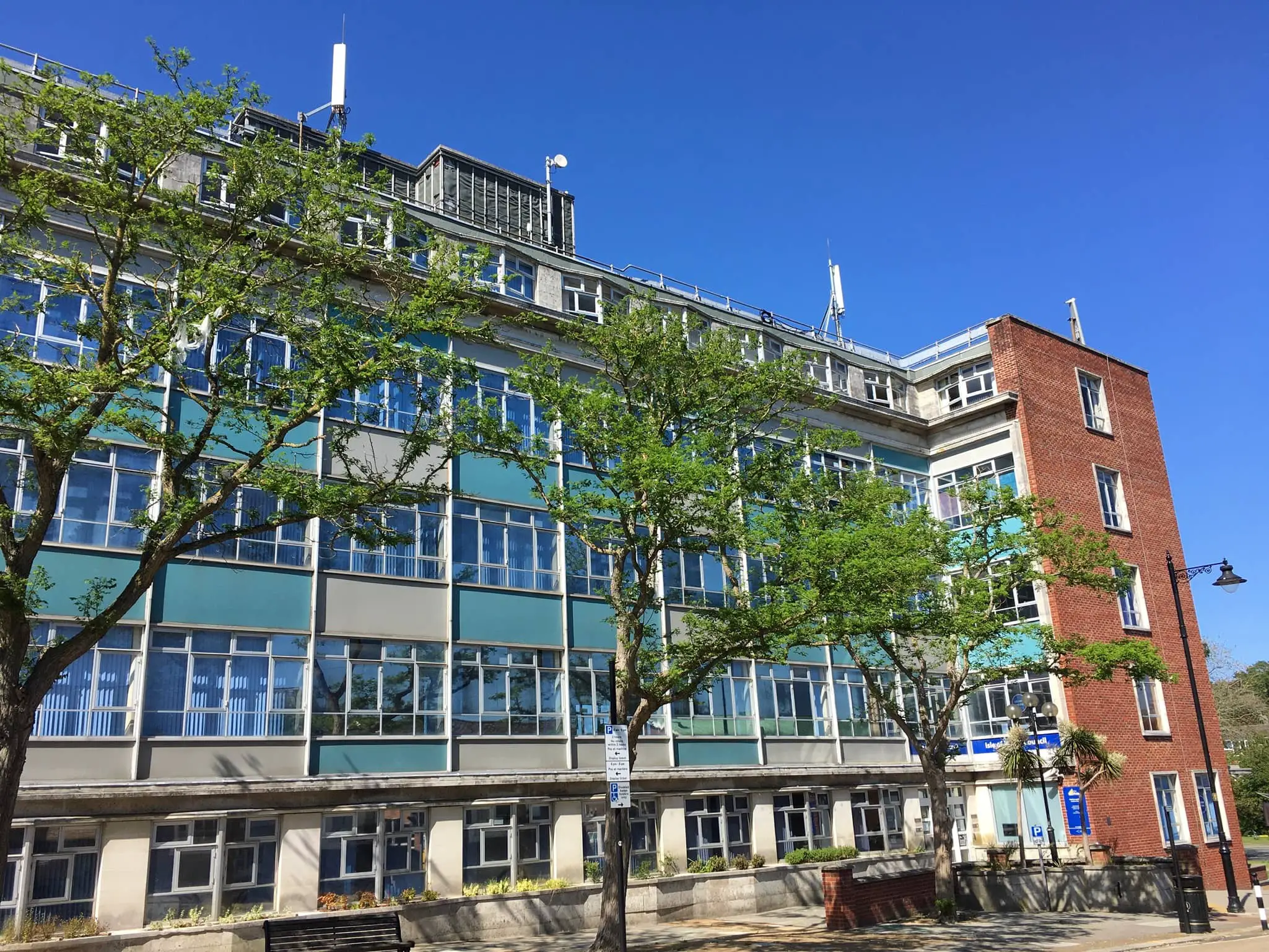Members of the council’s Corporate Scrutiny Committee voted for and against several recommendations yesterday afternoon in relation to the Draft Island Planning Strategy (DIPS).
Once approved, the Planning Strategy act as the rule book for future development on the Isle of Wight, without which, unless there is something significantly wrong with a planning application, new housing should be approved.
A set of recommendations from an informal Scrutiny Committee held in August was debated by the Committee (see below).
All but two recommendations approved
Recommendations 2a, 3, 4 and 5 were passed by the Committee, but the recommendations 1 and 2b – which called for the settlement boundaries of Freshwater and Bembridge to not be increased and housing instead be included in developments cited in Recommendation 1, which are namely Camp Hill, Newport Quay and Newport Riverside – fell.
Lilley: Not our role to identify specific sites
Cllr Michael Lilley (Alliance) argued that it was not the role of the Scrutiny Committee to identify specific sites at this stage.
He explained there would be a six week consultation period when specific sites could be discussed.
Lever: Suggesting specific sites “undermines the recommendation”
Cllr Joe Lever (Green/Alliance) said although he was in favour of the overarching recommendations he wondered whether specifying sites was necessary. He gave the example that in relation to plans for the ‘Riverside’ development (which covers the area around County Hall) he believed there was not enough evidence, so suggesting specific sites “seems to undermine the recommendation”.
Quirk: Need to define clearly what the sites are
Cllr Chris Quirk (Con and Vice Chair) argued the “less specific, the harder and harder it becomes”.
“We need to define clearly what the sites are because the more you water it down the less chance of delivering.”
Palin: Will have to abstain
Cllr Cameron Palin (IWALC) told the meeting that he would be abstaining from the vote due to receiving differing views from different Isle of Wight Association of Local Council (IWALC) members.
He gave the example that Bembridge had asked for him to vote in favour of the recommendation, whereas other councils had asked him to vote against it.
Cllr Joe Robertson (Con) explained that the recommendations for housing at Camp Hill had dropped from 1,200 to 800 after input from the ward councillor, Cllr Garratt (LibDem).
Garratt: It’s like adding half of Bembridge into half a ward
Cllr Andrew Garratt broke off from his holiday to join the meeting via the Internet to speak on behalf of his constituents.
He said he didn’t think the council had looked properly into the protection of Parkhurst Forest and the impact on wildlife and green spaces for residents. He added that he believed the numbers for Hunnyhill and Parkhurst should be lower.
“It’s like adding half of Bembridge into half a ward, it needs to be considered very strongly, the infrastructure impact huge.”
Robertson: Environmental not political reasons
Cllr Robertson cited flooding in Bembridge in July 2021 (after the last DIPS consultation) where one resident has still not been able to move back into their home more than a year later.
He said the reasons for not wanting the boundary settlement to be expanded in the village was down to environmental reasons, rather than the accusation being presented that it was for political reasons.
“It’s time the specific environmental reason in Freshwater and Bembridge are recognised by this committee.”
Lilley: Wrong to “put community against community”
Cllr Lilley responded by saying that councillors were “not professional planners”. He continued by saying it was clear at the internal briefing that “the officers were listening and had come up with a formula”. He added that officers said if they were asked by the Planning Inspectorate about their decision, “they would say it was a political decision to move the sites”.
He added that he believed it was wrong for the Committee to make that distinction,
“All it does in the public eye is put community against community and that is wrong.
Recommendation fell
When it came to the vote for recommendation 2b, the Chairman, Cllr Richard Quigley (Lab) used his vote against the recommendation so it fell.
It should be noted that these are simply recommendations to the Cabinet, who vote on the DIPS this Thursday evening. They can choose to ignore the recommendations or adopt them.
Once their vote has been cast the DIPS will go to full council meeting on the 21st September before being submitted to the Planning Inspectorate.
Recommendations in full
What follows are the recommendations from the informal meeting that the Scrutiny Committee voted upon. See the full paper on the council’s Website.
Recommendation 1: Sustainable Development on Brownfield, in areas where it is most needed by Islanders
The option of priority being given to allocating additional homes for the two key priority brownfield sites as defined in the 2021 draft, namely Camp Hill and Newport Harbour, and by creating a new third key priority site – Newport Riverside was discussed. It was noted that the additional land is currently in public ownership of several organisations including the Isle of Wight Council and Hampshire Constabulary.
There would be a need however to ascertain the expected yield of housing units if the Newport Riverside site was to be included as a proposed allocation. A quick exercise could possibly be achieved within 3 to 4 months, however it could take longer to fully ascertain the potential of the land and most appropriate route to delivery.
The recommended changes to the Draft IPS arising from the discussion on this matter are set out in Appendix 1 to this report as track changed versions of Policy KPS2 and Section 10.
A separate recommendation is that Cabinet are requested to immediately commence the scoping and commissioning of feasibility and technical work to understand the potential of the mixed-use development site on public sector land in Newport Town Centre. 8. Recommendations 2a & 2b: Protecting the Environment unless Development on Greenfield is “Absolutely Necessary” (as stated in the Council’s Corporate Plan)
Recommendation 2a:
The 2012 Plan protected rural areas unless development was necessary to satisfy a ‘local need’ (Core Strategy SP1). Councillors believed that the DIPS was likely to give less protection for greenfield by supporting development without evidence of a local need. This is considered by councillors to be contrary to national policy (i.e. S.78 NPPF) and the Council’s Corporate Plan.
It was felt that the draft should contain clear unambiguous provisions that prevent development outside of settlement boundaries unless there is clear evidence of a local community need that has been identified. This will benefit the environment, biodiversity, and the Island’s tourist economy and accords with the general wishes expressed by many Islanders during the consultation.
The recommended changes to the Draft IPS arising from this discussion (Recommendation 2a) are set out in Appendix 1 to this report as track changed versions of policies G2, H4, H7 and H10 and the IPS Glossary.
Recommendation 2b:
Councillors were aware that the DIPS proposes just over 300 dwellings to be built on greenfield sites by extending the current settlement boundaries of Bembridge and Freshwater. They believed that there is no evidence of a local need for this housing and the ‘affordable’ housing will not be affordable by locals in need (i.e. 20% reduction of market value). The settlement boundaries of these villages should not be extended to enable this unnecessary development to the detriment of the environment. The housing proposed for these villages would be subsumed by the proposals set out in 1 above.
There was discussion on the options of removing one site in Freshwater and one in Bembridge which were not currently subject to any planning application and the removal of all four sites, which was the preferred option for the committee members. Reference was made to consideration having to be given to replacing the units lost on these sites with units on other sites. It was believed that an increase to the number at Camp Hill, together with the recently approved Puckpool Hill application and looking at delivery trajectories on other large sites with planning permission towards the end of the plan period could overcome this issue.
The recommended changes to the Draft IPS arising from the discussion on this matter (Recommendation 2b) are set out in Appendix 1 to this report as track changed versions of policy H1, Appendix 1 and Appendix 2. 9.
Recommendation 3: Second/Holiday Homes
Reference was made to the fact that many residents were against new homes being purchased as second or holiday homes. The Best Practice examples from the peer challenge team include conditions to ‘ensure’ that this does not occur although the position in the Isles of Scilly were different to here.
An outline was given of what was currently included and the important role that Neighbourhood Plans, by town and parish councils, could play in restricting the use of new builds as second homes. Place plans and position statements were also important tools in planning policies at a local community level.
With regard to holiday homes the Government was undertaking a review of shortterm holiday rentals and the impact that this was having on popular tourist areas. This might influence future national guidance.
The recommended change to the Draft IPS arising from the discussion on this matter is set out in Appendix 1 to this report as a track changed version of policy C15. 10.
Recommendation 4: Environment and Commitment to Carbon Net Zero
There was discussion on the core message and objectives of the ‘Mission Zero Strategy’ which should not be confused with the Biosphere Reserve Status. It was noted that there would be increased emphasis on the Council’s Climate Change strategy which referenced the Biosphere status.
Corporate Scrutiny Committee are content that strategic policy BIO1 in Section 3 (as drafted in April 2022 version) has already been renamed to CC1 Climate Change (in July 2022 version) and also reworded to reflect the Corporate Plan and Climate & Environment Strategy Net Zero ambitions and targets which would support and help maintain Biosphere designation. Policy CC1 is reproduced in Appendix 1 to this report for clarity. The Net Zero standard policy for all new residential development is already in the Draft IPS (Policy C11). 11.
Recommendation 5: Freeport Strategy
Being part of a Freeport should attract considerable investment, and analysis suggested Freeport status could draw an estimated £1 billion of extra investment into the Solent area. It is suggested that the Freeport will create over 16,000 new jobs in the Solent area and we should seek to ensure that a fair proportion of those jobs are on the Island. There was discussion on greater reference being made to the Freeport and whether there should be a new dedicated Freeport policy.
The employment land allocation in the 2021 draft at Kingston Marine Park was a good example of an area that could benefit.
The Island was not within the areas of principal activity allocated within the Freeport status. It has been confirmed there are no Freeport tax or customs sites on the Isle of Wight where permissive planning tools such as a Local Development Order might be of assistance.
Also there was insufficient detail available as to the actual impact that the status would have for the island. Reference was already included within the draft plan within the economic development section.
Corporate Scrutiny Committee are content that stand alone Policy E12 Solent Freeport has already been added with as much detail as is known about the Freeport and the potential benefits for the island, providing in principle support for development that facilitates investment/innovation linked to the Solent Freeport. Policy E12 is reproduced in Appendix 1 to this report for clarity.





